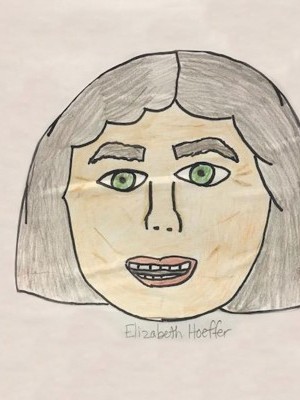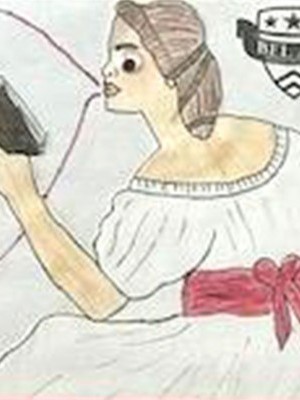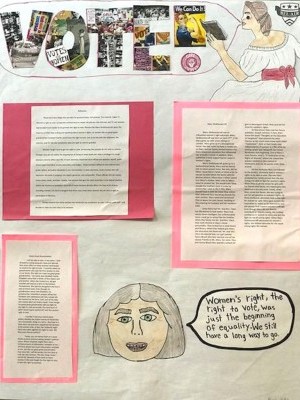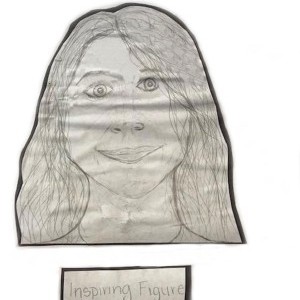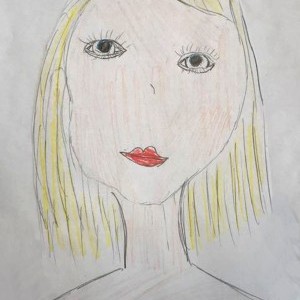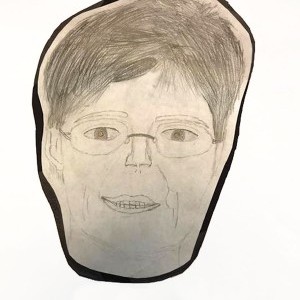Brooke Kelly
Bel Air High School | Bel Air, MD | 9-10th Grade
Inspirational Family Member
My Great-Great-Grandmother
I will be able to vote in two years. I look forward to voting because I have just learned how much effort so many women contributed to receive the right to vote. I recently asked my grandmother who was the first woman to vote in our family. She told me it was my great-great-grandmother. Her name was Elizabeth Hoeffer.
Elizabeth came from a family of four sisters and one brother. When she moved out, she got married and lived on a farm in Norristown, Pennsylvania. She had two daughters and was a stay-at-home mom. Even though my grandmother never met Elizabeth, my grandmother remembers people telling that Elizabeth was submissive and led a simple life. She worked on her farm, took care of her kids, and cooked plain yet hearty meals. Even though my great-great-grandmother did not fight for the right to vote personally, the hard work of other women gave women all over the country the right to vote.
I wonder if she even cared about politics –besides the recent events of World War I– as a housewife, living on a farm. She lived in a time when not everyone supported the decision to let women vote. In fact, her husband might have even been against her right to vote. Did they even discuss politics?
Today, you can barely look on a social media account without seeing people's political views. Where Elizabeth might have had a limited amount of information available to her, I will have almost too much information available to me. Just like my great-great-grandmother may have felt, I will be excited my first time to vote but also nervous. The one thing I know I cannot do, because of how hard so many women in the past fought for the right to vote, is take this right for granted.
Historical Figure I Admire
Mary Wollstonecraft
Mary Wollstonecraft was an influential women's right advocate. Mary Wollstonecraft was born on April 27th, 1759. Mary grew up with seven siblings in London. Mary grew up in a disorganized home. Her dad could not keep a steady job, so Mary and her family moved homes a lot. Mary respected education and that influenced her to build a school. In addition, Mary published a book supporting her cause in women's rights.
Mary Wollstonecraft grew up in a dysfunctional family, Mary and her family had to move several times. Not only did her father cause Mary's family to move a lot, he caused turmoil within the family with his abusive actions. When Mary's father would hurt Mary's mother, Mary tried to take a stand to protect her. She would even sleep outside her mother's door in order to protect her. Later in life (1783), Mary moved back in with her sister Eliza, where Mary believed Eliza was being abused like their mother. Mary acted and convinced Eliza to leave the toxic house, resulting in Eliza leaving her husband and her newborn baby.
Once Mary met Mr. And Mrs. Clare, her life started to look better. Mary had always been intelligent, but unfortunately never could go to school like her brother. When the family met Mr. And Mrs. Clare, they took interest in Mary's clever personality. They invited her in their home and library, where they helped give Mary the education she deserved. Mr. And Mrs. Clare introduced Mary to a girl named Fanny Blood who later became one of her closest friends in life. Mary, her sister Eliza, and Fanny Blood then opened a school for girls in Newington Green. Mary proved her drive for women's rights.
At the school, Mary met her future publisher, Joseph Johnson. In fact, Mary wrote the book “Thoughts on the Education of Daughters” that covered the same themes as her much more known work called “Vindication”. Both of their books urged independence of women. In 1789, while her writing career was taking off, the French Revolution was beginning. One of Mary's most famous works is: “A Vindication of the Rights of Women," where she stated how women needed to take control of themselves and not let people order them around.
All the attributes Mary contributed to the society, ultimately led to women's right to be able to vote. The way Mary protected her family proved that she was strong and able to fight for women's rights. When Mary built the school for girls with her friends and family, she helped girls who deserved to be educated. Finally, when Mary wrote her books, she was trying to put her perspective on women's rights. All these attributes ultimately lead to the right for women to vote. Mary gave women the inspiration to stand up for themselves and join groups that support women's suffrage. Even though Mary did not directly contribute to women voting, she instilled confidence in women to come and join the fight for equal voting rights. When Mary Wollstonecraft advocated for women's rights, she helped advocate for the equal voting rights for women.
What the Project Means to Me
There are many things that we take for granted today. Cell phones. The internet. Cable TV. Women's right to vote. Companies worked hard to create cell phones, the internet, and TV, but women had to work even harder to be granted the right to vote. Women like Mary Wollstonecraft spent the majority of their lives writing and speaking about women's rights, so women like my great-great-grandmother Elizabeth Hoeffer could have the right to vote. Just as we do with the cellphone, the internet, and TV- we also sometimes take the right to vote for granted.
Women fought hard to get the right to vote, so knowing that people do not vote is a shame. Perhaps they do not realize the importance of voting on every level and what a privilege it is. Local elections directly affect your life. In local elections, important local offices are selected: sheriff, public school superintendent, county executives, and judges. These positions influence law enforcement, public safety, and public education in our communities. In state elections, voters choose who will represent the state in congress, the state's governor, and comptroller. These officials directly impact states taxes, roads, and laws. Usually, the election that gets the most attention is the federal election where we choose our president. Since all of these elections directly affect the lives of all citizens, including women, it is hard to imagine that there was a time when women did not have a right to participate in elections.
Doing research into these women has reinforced my excitement to vote. I cannot wait until I will be able to have my own voice in an election.
Explore the Archive
More From This Class
Click on the thumbnails below to view each student's work.Deadline Extended
There's still time to join Women Leading the Way.
Become a part of our storytelling archive. Enroll your class today.
Join the Project

